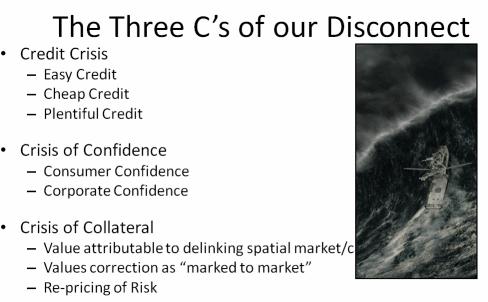|
Question Topic. Three C's. In one of your articles in the Appraisal Journal you mention the "Three Cs." Can you expand on that concept and explain what you meant and its implications for the industry? What are some of the lessons learned?
DrD's Answer
The 3 C's is a DeLisle'ism I coined in my October 2008 article focusing on Credit, Confidence and Collateral. The objective was to shed some light on how we got into the crisis that was rapidly spreading across the commercial real estate market. As I explained, we were facing an unprecedented confluence seemingly independent, but related events. The problems began to surface in the residential credit markets. Once attention was drawn on festering problems in the residential market, some began to worry about whether this was a symptom of a broader problem. Those who began to explore how widespread the credit practices were in other sectors, realized that we had created a house of cards. As attention turned to the broader economy, the credit crisis quickly turned into a crisis of Confidence. The crisis of confidence was contagious, rippling across the consumer and corporate spectrum forcing many players to revisit expenditure patterns. After confidence levels were eroded, the market faced the double-whammy of tightening or evaporating credit. This quickly translated to an erosion in Collateral values, leading to a self-fulfilling prophecy which became a black hole that started the implosion.

Given the three strikes --credit, confidence, and collateral-- working against the real estate market, turning the corner will require that at least two of these factors be reversed or neutralized. Unfortunately, this has proven difficult in spite of the government's all-out efforts to stabilize and ultimately reinvigorate the credit markets. Despite record bailout efforts and massive spending, credit remains tight and confidence is lagging. Furthermore, for commercial real estate the situation is getting worse as a result of the accelerating declines in collateral value which is likely to continue for some time. Thus, when the economy finally turns, commercial real estate is expected to lag on the upswing more than "normal" which is appropriate for these abnormal --but not unprecedented-- times.
Lessons Learned
In terms of lessons learned, here are some of my favorites. First, sellers will have to capitulate, to mark assets to realistic prices. Second, the spatial/capital market divide will have to be closed, a difficult proposition in the current market. Third, securitization which was seen as a panacea in the mid-90s is not a permanent cure for the real estate market, especially if it entails a disconnect from fundamentals. Fourth, manipulating numbers and backing into structures and engineering is not sustainable; in the end, it depends on the real estate. Fifth, not all distressed assets are create equal and offer equal risk-reward. Sixth, while some see the environment as offering "no-brainer" opportunities, the market is more complex and investors must be able to sift and winnow assets to focus on those with solid fundamentals. Finally, although attention has been focused on "interventions and stimulus," little attention has been paid to the consequences especially the unintended ones; of those actions.
|
Disclaimer and Copyright
The answers to questions I address on this website are my personal responses and may or may not accurately reflect best practices or current industry standards. Furthermore, they are not rendered as consulting recommendations and should not be relied on in making business decisions. I am offering them here for informational purposes only and hope to stimulate creative, objective, disciplined thought on the selected questions or issues. I reserve the right to edit my responses, add or delete questions, or restrict access. In answering questions, I am drawing on my combined academic and professional career and present them in hopes of improving the quality of decisions that affect the built environment and advance the state of the art and body of knowledge. If you have questions or suggestions for enhancements or improvements to this feature, please Contact Me directly. If you are responding about a question, please indicate the ID# to the lower right of the answer. |
|
